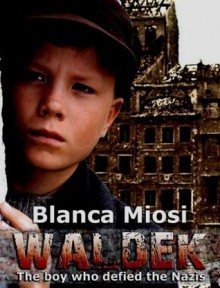
An extraordinary life, and extraordinary novel.
Waldek by well-known (to the Spanish reading public) author Blanca Miosi is the chronicle (novelised) of a life. It is indeed a novel but based on a first-hand account by Waldek Grodek of his life. The volume I discuss is the translation of the author’s bestseller La búsqueda (The Search).
All lives are extraordinary but some (be by design, by good or bad luck or by fate) are more extraordinary than the great majority. This is one of them. Waldek was born in the wrong place at the wrong time (or maybe not, it depends on your point of view).
Being born in Poland and being a teenager at the time of Hitler’s invasion is not very lucky. His decision to be actively engaged in the resistance (however modest form it could take at such young age) could be seen as the first of many unwise (or at least detrimental to his own well-being) decisions he would take over his life. It lands him in a concentration camp (first Auschwitz and then Mauthausen). He manages to cope with his experience by focusing on survival at all costs and trying not to think too far back or ahead. This portion of the book is fascinating but hard to read, no matter how many books on the subject and personal accounts you have read before. Indeed it’s true that each person’s suffering is different to anybody else’s, and so are the defence mechanisms they use to survive.
I will not go into detail about all the adventures Waldek goes through in his life, but let me say he travels to South America, he sees success but also poverty, he is forced to live in circumstances not of his choosing more than once, but he survives.
One of the qualities of this book as that it succeeds in not turning the protagonist into a hero or a Saint. He remains a human being, who might not fully understand or like what he feels he has to do, who is not always consistent, and who loves and hates at times against his best interests and irrationally. He remains a complex and credible human being, even if not always a likeable one. Personally we might question some of his decisions, his expressed thoughts and ideas, and wonder how many of his sometimes surprising reactions and attachments might relate to his early traumatic experiences, although he never allows himself any excuses and pushes on.
Novels like this one that take place in recognisable historical times and situation, make us question what would we do. And if we’re honest with ourselves, we might not like the answers we get. Would we be more generous or less? Would we take more risks, or fewer? Would we be as naïve? Would be have pursued justice at all cost (even our own), or decided on forgiveness? Can we truly know?
This being a first-person narration it presents a very specific perspective on the events and we can’t but question how much the narrator tells us and how much he censures. I did feel that there were many things I didn’t know or heard about, and those will keep me thinking, and that’s something I appreciate in a book.
However accurate we might believe all the details are, the story is a page turner, and no matter what our personal feelings for the protagonist might be, we want to know what happens to him and try to solve his puzzle. Blanca Miosi writes fluidly, with enough detail to allow us to create a mental picture of the locations and people, and she is particularly skilled at making us hear Waldek as if he was sitting next to us telling us his story. I understand that the author tried at first to publish the story (of her now dead husband) as a personal account and was told by a publishing company that those did not sell very well and they would only be interested if it were a novel. Several years of hard work resulted in this book. The novel is not only Waldek’s journey through life, but also Blanca Miosi’s search for her literary voice, and it is a success in both accounts. If you dare to go on this journey with Waldek and the author, I’m sure you won’t regret it. See what you discover.


 Log in with Facebook
Log in with Facebook 






